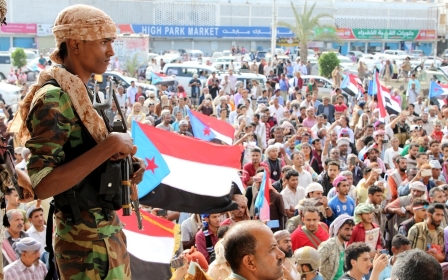Yemen separatists capture Aden, government confined to palace
Southern Yemeni separatists took control of the port city of Aden after two days of fighting, residents said on Tuesday, confining the government of President Abd-Rabbuh Mansour Hadi to the presidential palace.
Fighting between southern separatists, backed by the United Arab Emirates (UAE), against forces loyal to Saudi-based president Hadi, risk crippling their once united campaign against the Iran-aligned Houthi movement in Yemen's north.
"The separatists have surrounded the palace and now control the main gate. Those inside are unofficially under house arrest at this point," said the source, a high-ranking officer with the Yemeni military.
Tension between the separatists and the government erupted into clashes at the weekend, with more than 36 people killed in Aden since Sunday, according to the International Committee of the Red Cross.
Brigadier Saleh al-Sayyed, who heads troops that have fought alongside the separatists since Sunday, announced his forces had seized control of the Fourth Brigade, the presidential guard in Aden.
Residents said forces loyal to the Southern Transitional Council (STC), formed last year to push for the revival of the former independent state of South Yemen, seized the last stronghold of Hadi's Presidential Protection Forces in the Dar Saad area of northern Aden, in battles that at times involved heavy artillery and tank fire.
Activists shared photos on social media of the flag of the former independent Southern Yemen state flying over the base's gate. Southern Yemen was united with Northern Yemen in 1990.
Aden residents said STC fighters had earlier overrun Presidential Protection forces outposts in central Aden's Crater and Tawahi districts.
They stopped outside the al-Maasheeq palace, where Prime Minister Ahmed bin Daghr's cabinet is based, they said.
Witnesses said hundreds of people danced and sang as they celebrated the STC victory with fireworks that lit the night skies over Aden. The crowd chanted slogans demanding restoration of the southern state.
The fighting began on Sunday after a deadline set last week by the STC for Hadi to dismiss bin Daghr's government, which the STC accused of corruption and mismanagement. The government denies the allegation.
Sources at the STC said negotiations were underway to allow bin Daghr's government to leave the city safely, but a government source said bin Daghr had no intention to leave Aden.
The Saudi-led coalition, which intervened in Yemen's civil war in 2015 to restore Hadi's government after the Houthis forced him into exile, called in a statement on Tuesday on both parties to cease hostilities.
"The coalition will take all the measures it deems necessary to restore stability and security in Aden," it said.
Although Hadi remains in exile in Saudi Arabia, his administration and local allies nominally control about four-fifths of Yemen's territory, although most population centres are in the hands of the Houthis.
'The coalition will take all the measures it deems necessary to restore stability and security in Aden'
- government source
Formerly independent states, North and South Yemen were unified in 1990 under the presidency of Ali Abdullah Saleh, who was killed in December in clashes with the Houthis in Sanaa.
The factional fighting in the south compounds the misery of Yemenis whose country has been torn apart by three years of conflict between Hadi's forces and the Houthis, which has also opened the way for Islamist militants to widen their influence.
In the southern Shabwa province, at least 12 soldiers from another local forces trained and backed by the UAE were killed in a bomb and gun attack on their outpost, residents and officials said.
While no one claimed responsibility for the attack, it mirrored previous operations by Al Qaeda in the Arabian Peninsula (AQAP).
Stay informed with MEE's newsletters
Sign up to get the latest alerts, insights and analysis, starting with Turkey Unpacked
Middle East Eye delivers independent and unrivalled coverage and analysis of the Middle East, North Africa and beyond. To learn more about republishing this content and the associated fees, please fill out this form. More about MEE can be found here.




